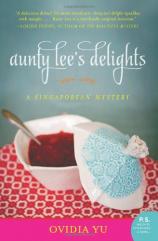Reading Group Guide
Discussion Questions
Aunty Lee's Delights

1. When her wealthy husband died, Rosie Lee could have settled for live as a Tai-Tai: “wearing designer clothes and going for manicures and overseas holidays.” Why do you think she decided to open AUNTY LEE'S DELIGHTS instead?
2. How would you describe Aunty Lee’s relationship with her stepson, Mark, and his wife Selina? What’s her motive for keeping them close? And what is theirs for staying close?
3. “To Aunty Lee, comfort meant being dressed for the job. It was obvious to her that getting the upper hand in an interview with a police officer required a different outfit from supervising the cleaning of bean sprouts.” What do you think of Aunty Lee’s deliberate change of clothing? Do we tend to change how we present ourselves depending on who we’re dealing with?
4. How women dress is frequently commented upon in Aunty Lee’s Delights, from Aunty Lee’s changes of clothing to Selina’s belief that “how women talked, dressed and behaved was to blame for unwanted male attention” to Frank Cunningham’s proclamation that that “short haired women in pants…it’s just not right.” How do these views reveal things about the characters who hold them? How do the different women in the novel—Selina, Carla, and Nina, for example—deal with expectations about how they should look and behave?
5. When Aunty Lee goes to visit SSS Salim at his office, she makes sure to take along an assortment of her best snacks, which are so delicious that the previously wary Salim “looked across at Aunty Lee with something like devotion in his eyes.” Give other examples of Aunty Lee using her culinary powers to influence people. Is there a special food guaranteed to earn your devotion?
6. Aunty Lee says that she is personally invested in finding Laura and Marianne’s killer because “The two girls who died both came to eat in my restaurant. If they ate my cooking, they are my guests and they are my family.” Later she tells Carla that “I feel responsible for the people I feed. Once my food has gone into them and become part of them and their lives, I become part of their lives.” Do you believe her? Are there other reasons for her sleuthing?
7. The characters in Aunty Lee’s Delights come from the many ethnic communities who live in Singapore, including Indian, Australian, Filipino, and Peranakan (people of mixed Malay and Chinese descent like Aunty Lee and the novel’s author, Ovidia Yu.) Do the characters still fit into a kind of social hierarchy or are they all treated equally in Singaporean culture? Can you detect positives and negatives about this mix of ethnicities?
8. Aunty Lee reflects that “People ought to go through the ideas they carried around in their heads regularly as they turned out their store cupboards. No matter how wisely you shopped, there would be things in the depths that were pas their expiry dates or gone damp and mouldy—or that had been picked up on impulse and were no longer relevant. Aunty Lee believed everything inside a head or cupboard could affect everything else in it by going bad, or just taking up more space than it was worth.” Which characters have ideas that might need to be updated or discarded? Which have a few bad ideas that might be spoiling everything else in their lives?
9. Rosie Lee’s late husband, ML Lee, described her as “em zhai se—not afraid to die” which describes how “Aunty Lee drove everyone around her through frustration to despair as she pursued some triviality that no one else could see any point in.” What do you make of this description of Aunty Lee? By the end of the novel, how has her em zhai se personality made a difference?








